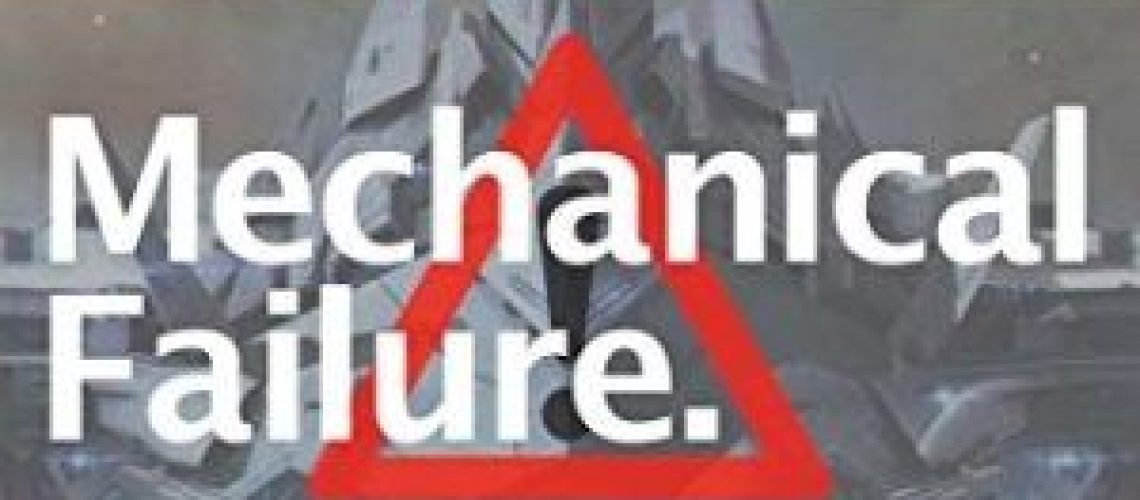Sergeant R Wilson Rogers, having given up a cushy berth in the make-work peacetime military fleet to try his hand at the profitable world of smuggling, finds himself dragged back into the military when it turns out that interstellar smuggling isn’t as easy as it seems. Fortunately, he can even get back into his old unit, the 331st. The bad news is that, even in the relatively short time since he has been gone, the military has gone even more around the bend. And only Sergeant Rogers seems capable or aware enough to try and stop an interstellar war and a robot uprising at the same time, despite his tendency toward indolent laziness. Like it or not, Rogers is going to have to do some real work for a change. The Two Hundred Years Peace is riding on it.

Mechanical Failure is the debut novel from Joe Zieja.
The cliche that dying is easy and it’s comedy that’s hard is absolutely true of science fiction and fantasy. Oh, the occasional funny character and comic relief character is a staple of any fantasy adventuring party, and who hasn’t encountered the wry humor of Mr. Spock? But a straight-up comedy novel is a far different beast. Comedy and what people find comedic often ages terribly, and trying to actually have something more than a series of jokes and organizing a plot is, plainly, difficult. The names that everyone cites are Douglas Adams and Terry Pratchett. And a few people will pitch Robert Asprin and Harry Harrison into that. Or even, most recently, John Scalzi. The reason why these names get cited over and over, and there isn’t a wealth of names to choose from, is that comedy in fantasy and science fiction is extremely difficult to pull off. The few examples are the only ones with any traction. It’s not even that doing the comedy is hard, but having it hang together in any sort of coherence is nearly impossible. And then there is the tension between characters who may or may not know they live in a comedic universe, and the universe itself that they inhabit.
So where does this leave Joe Zieja? And where does that leave Mechanical Failure?
The author goes for an absurdist approach to his science fiction comedy and his universe. Military bureaucracy and its nature gets a large workout here. The uncaring, fundamentally silly nature of the world the character lives in goes for indignity and gross humiliation in large spades. Humor ranges from the visual to textual puns. Standard issue military rations, for example, have the acronym SEWR. So they are, naturally then, SEWR rats. And so it goes. It took me a chapter or two of less than enthusiastic reading to realize and accept that the universe that the author presents here is fundamentally non-realistic. It is a worse than useless idea to try and make a coherent exterior world for Sergeant Rogers to inhabit, because the fundamental non-sensical nature of his world is the canvas of the humor he is painting. Our narrator, in some ways like the characters in Scalzi’s Redshirts, or Harrison’s Bill the Galactic Hero, groks and understands the kind of universe he lives in, and indignity and reversals await him around every corner of the warship. (Actually, the menacing droid barber that wants to desperately give him a regulation haircut is lurking around every corner of the warship). What this means is that the novel is a series of absurdist, exaggerated, caricatured scenes, played high for the laughs at all points, Rogers all too aware that the world makes no sense.
Does the humor work? Yes. It does remind me of Harrison, and also relatively early Pratchett, and works on those levels in terms of the quality of the read. The novel, like Pratchett, does like to break the frame of the narrative with the occasional footnote. These footnotes if anything can be even more absurd in their humorous propositions than the narrative, like suggesting a certain dictator today is remembered in the future as a famous mathematician. People looking to compare this to mature Pratchett or Douglas Adams, though, are going to be mightily disappointed. It’s funny, and the dials of the humors here are set on high, but aren’t quite perfectly calibrated to reach anywhere near those rarified levels.
And as far as characters, or plotting, or worldbuilding go, while the actual plot of the novel does kick in the back half, all three are, really, besides the point. The novel could have used a somewhat better calibrated protagonist than Rogers. Part of the memorability of Adams and company is that people remember Arthur Dent, Bill, Twoflower, and Rincewind. Rogers is nowhere near that list of worthies, sad to say. The situations he gets in are more memorable than the character himself.
The novel works best as a diversionary read, the quintessential book that you take up to the lake or to the beach, and sit and read to pass the time without too much taxing thought or heavy-duty concentration. If you let it in on those terms, and on its terms, as said before, the novel can and will entertain you, but looking too hard at the edifice, or taking it too seriously, and the edifice falls apart rather quickly. I also think that it works fairly well as a palate cleanser between larger, heavier, weightier novels. Not every novel needs to be War and Peace, or the Book of the New Sun. Mechanical Failure understands that, and runs with that philosophy. But it is important to understand and want that, or reading the book will be a most disappointing experience.







